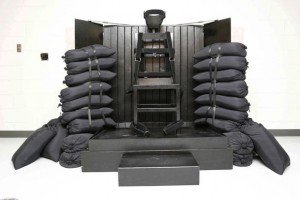Utah Firing Squad Execution: An Outdated Ritual?
 Utah recently enforced its death penalty statutes by executing convicted killer Ronnie Lee Gardner by firing squad. The mid-June execution has brought the debate on the death penalty to the fore once again.
Utah recently enforced its death penalty statutes by executing convicted killer Ronnie Lee Gardner by firing squad. The mid-June execution has brought the debate on the death penalty to the fore once again.
Many people and organizations like Amnesty International seek to abolish the death penalty sentence in general, claiming that it is “savage” and a violation of the most basic human right- the right to live. Proponents of capital punishment often cite such issues as deterrence and cost evaluations when seeking to justify executions by the state.
And then there’s the debate on the methods used in executing the death penalty. Traditionally the inquiry has been whether the firing squad method is more humane than lethal injection, which is the one of the more common methods of execution in the U.S. While the firing squad method technically is supposed to be less painful (the defendant usually dies within a few minutes), some view lethal injection as more humane due to the absence of bloodshed.
But many people might not be aware that the idea of bloodshed might be one of the reasons why Utah had retained the firing squad method as a choice for inmates. Some historians claim that the firing squad method was originally adopted in relation to 19th century doctrines of Mormonism, the state’s predominant religion.
Early members of the movement believed that certain crimes could be atoned for only through the spilling of the offender’s blood. However, the Mormon Church currently does not advocate such principles, and Utah has eliminated the firing squad as an option for defendants who were convicted after 2004. It is unclear whether Gardner’s religious views had anything to do with why he chose the firing squad.
Utah’s history of firing squad executions may actually help make sense of the antiquated method. In a somewhat unconventional op-ed piece on the constitutional issues involved in the Utah execution, Douglas Miller portrays firing squad executions for what they really are: a ritual. In his article, Miller questions whether the state may constitutionally administer a ritual that he considers to be an important part of a person’s religious views.
Whether they are religious or not, firing squad executions are in fact a ritual. Everything involved- the last meal, the blindfolding, the fact that it happens at midnight- is part of an intentionally orchestrated ritual that dates back centuries. As David Dow writes in his blog, rituals such as executions exist to help people (particularly the victim’s family) in emotionally obtaining a sense of justice. Some also claim that the firing squad ritual allows some dignity for the offender as it is supposed to be a “heroic” way to “face justice” (the idea actually does personally conjure up images of revolutionaries who were executed in that manner- but maybe that’s just me).
The problem with this particular ritual is that it just may be too outdated and disconnected to have a relevant impact. This is not only because a great number of people are desensitized by the media, but also because I think our whole culture is a bit far removed from rituals in general. Rather than having any type of ritualistic meaning, as Dow put it, the execution simply makes our nation into voyeurs.
To illustrate how surreal the entire ordeal has been, Attorney General Mark Shurtleff announced the execution on Tweeter, where he stated that he’d given the corrections officer the “go ahead” to proceed with the execution. Really, Twitter? This is what I mean when I say that we may be far removed from ritual- we’re not always too keen on perceiving the gravity of the situation.
The death penalty is one of the most delicate subjects out there, and after thinking about it as a ritual, I can see why. Capital punishment raises the question of whether one person is ever justified in taking the life of another. It involves ultimate decisions of life and death, and may implicate (dare I say it) the rift between church and state.
While the death penalty debate is here to say, the firing squad method is well on its way to becoming extinct- Utah is one of the few places remaining where it is applied, and even it revoked it as a method of execution for crimes after 1984.

Comments